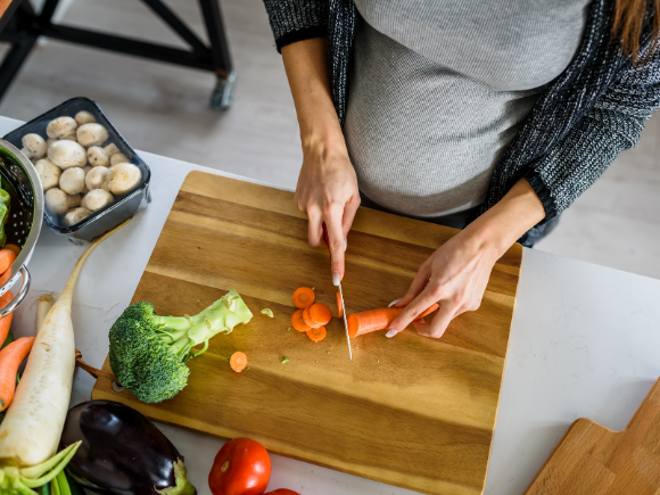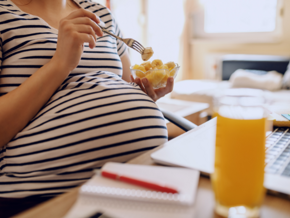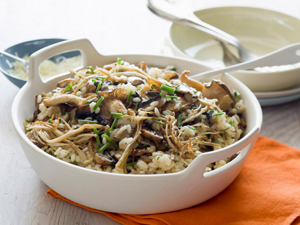
Navigating a Coeliac Pregnancy: Gluten-Free Diet Tips & Nutritional Advice
By Marika Day, Accredited Practising Dietitian and Nutritionist with over a decade of experience in the areas of women’s health, gastrointestinal nutrition and disordered eating.
If you have been diagnosed with coeliac disease, it can feel overwhelming trying to ensure you are prioritising both your baby’s and your health while adhering to a strict gluten-free diet. On top of avoiding gluten, pregnancy brings additional food restrictions, such as avoiding certain fish, undercooked meat, many preprepared foods and unpasteurised dairy. At times, it may seem like there’s barely anything left that's safe to eat.
Fortunately, with the right preparation and knowledge, a healthy, fulfilling gluten-free pregnancy is entirely possible. This article provides evidence-based guidance and tips, along with some of my personal experiences, to help you manage nutrition during pregnancy if you have coeliac disease. It is important to note that the information provided in this article is based on my experience and is general in nature. Speak to your GP or dietitian for personalised advice and if you have any concerns.
What is coeliac disease?
Coeliac disease is an autoimmune condition affecting approximately 1 in 70 Australians, although it remains under-diagnosed (Coeliac Society Australia, 2023). When a person with coeliac disease consumes gluten—a protein found in wheat, barley, rye, and oats—the immune system attacks the lining of the small intestine. This damage hinders nutrient absorption, which is especially concerning during pregnancy, when increased nutrients are required for both mother and baby.
Common symptoms of coeliac disease:
- Digestive issues (bloating, diarrhoea, constipation)
- Fatigue
- Unexplained weight loss
- Iron-deficiency anaemia
- Skin rash (dermatitis herpiformis)
For me personally, fatigue was my primary symptom, going to show that coeliac disease really does present with a range of symptoms that can even be unrelated to the gut. If you are concerned about your symptoms, talk to your healthcare professional to get tailored advice for you.
How to treat coeliac disease
The only treatment for coeliac disease is lifelong adherence to a strict gluten-free diet. By eliminating gluten, the small intestine can heal, helping prevent further complications and nutrient deficiencies. This can be challenging during pregnancy when nutrient needs are higher, but with proper planning, a nutrient-rich gluten-free diet can be enjoyable and achievable.
Do babies need gluten during pregnancy?
No, babies do not require gluten for development. For those with coeliac disease, gluten exposure could hinder nutrient absorption, potentially impacting foetal development. Therefore, a strict gluten-free diet safeguards both you and your baby.
Nutrients important for a healthy pregnancy
Here are some of the key nutrients that are essential during pregnancy:
- Folic acid: Reduces the risk of neural tube defects.
- Iron: Supports increased blood volume and foetal brain development.
- Calcium: Important for bone development in your baby.
- Vitamin D: Helps absorb calcium and supports bone health.
- Vitamin B12: Supports blood formation and neurological development.
- Fibre: Aids digestion and can help prevent constipation.
- Omega-3 fatty acids: Supports brain and eye development.
- Iodine: Supports thyroid function and foetal brain development
- Choline: Essential for foetal brain development.
It’s generally recommended for all pregnant women to take a prenatal or pregnancy multivitamin to help meet their increased nutritional needs. However, those with coeliac disease may require additional supplementation tailored to their dietary intake. It’s best to work with your GP or Dietitian to identify any specific supplements you might need to help ensure you and your baby receive the necessary nutrients for a healthy pregnancy. For instance, I found it essential to add an iron supplement during my pregnancy, as maintaining healthy iron levels through food alone was challenging.
For more reading on important nutrients during pregnancy, check out our article healthy food for pregnancy.
What are the best gluten-free foods to add to your pantry during pregnancy?
Maintaining a balanced diet rich in nutrients is possible on a gluten-free diet. Here are some excellent gluten-free foods to stock your fridge and pantry with during pregnancy:
- Dark leafy greens: Rich in folate, iron, and calcium.
- Dairy products: A great source of calcium
- Quinoa and buckwheat: Gluten-free wholegrain sources of fibre and protein.
- Legumes (chickpeas, lentils, beans): High in fibre, iron, and folate.
- Canned tuna, salmon and sardines: Packed with omega-3s
- Eggs: A great source of protein and choline for brain development.
What is a good gluten-free meal plan that I can follow during pregnancy?
During pregnancy, it can be helpful to follow a gluten-free meal plan to assist in eating a variety of nutrient-dense foods. Here's an example 7-day meal plan that can serve as a guide:
7-Day Gluten-Free Pregnancy Meal Plan
Day 1
- Breakfast: Scrambled eggs with spinach and gluten-free toast.
- Lunch: Quinoa salad with chickpeas, roasted vegetables, and feta.
- Dinner: Grilled salmon with sweet potatoes and steamed broccoli.
- Snacks: Greek yoghurt with mixed berries, almonds.
Day 2
- Breakfast: Gluten free granola with Greek yoghurt and fresh fruit
- Lunch: Roasted vegetable frittata
- Dinner: Lasagna made with gluten free pasta sheets served with steamed greens.
- Snacks: Roasted mixed nuts and dried apricots
Day 3
- Breakfast: Chia pudding with Greek yoghurt topped with kiwi fruit and berries
- Lunch: Lentil and vegetable soup with gluten free toast
- Dinner: Stir fried tofu and vegetables with brown rice
- Snacks: Rice cakes with avocado and apple with peanut butter
Day 4
- Breakfast: Mango smoothie bowl topped with gluten free granola
- Lunch: Gluten free wrap with salad, cheese and canned tuna
- Dinner: Roast chicken with roasted pumpkin, carrot and potato and steamed greens
- Snacks: Hummus and rice crackers, Greek yoghurt and mixed berries
Day 5
- Breakfast: Gluten free French toast topped with Greek yoghurt and sliced banana
- Lunch: Baked sweet potato topped with black beans, corn, Greek yoghurt and tomato salsa
- Dinner: Baked mushroom risotto
- Snacks: Bliss balls and hummus with vegetable sticks
Day 6
- Breakfast: Quinoa porridge with banana and peanut butter
- Lunch: Salad with greens, chickpeas, feta, boiled egg and brown rice
- Dinner: Roast vegetable pasta using pulse pasta
- Snacks: Greek yoghurt with mixed nuts and gluten free banana bread
Day 7
- Breakfast: Vegetable omelette with mushrooms, spinach, and cheese
- Lunch: Falafel salad bowl with greens and tahini dressing
- Dinner: Green curry with fish, vegetables and rice
- Snacks: Gluten free toast with cheese and cucumber slices
Gluten-Free Snacks I Loved During Pregnancy:
• Bliss Balls: Made from dates, nuts and coconut, these are perfect for curbing sweet cravings while providing a good source of energy.
• Yoghurt + Granola: Either a store bought gluten-free granola[LS1] or one I had made myself paired with yoghurt made a great high protein, high fibre filling snack. I often found myself having this late at night when I couldn’t sleep.
Food cravings during pregnancy can be a little more tricky for mums with coeliac disease. Having gluten free snacks ready to go can help you meet those craving needs and avoid eating unhealthily.
Where Can I Learn More About Being Gluten-Free During Pregnancy?
If you're looking for more resources, there are great cookbooks and websites dedicated to coeliac-friendly pregnancy nutrition. I recommend:
- Cookbooks: Gluten Free Mediterranean by Helen Tzouganatos
- Websites: The Coeliac Society Australia
- Social Media: Follow me @marikaday
With the right support and careful planning, a gluten-free pregnancy can be both healthy and fulfilling. Remember to consult with your doctor or dietitian to ensure you’re meeting your nutrient needs.
Frequently asked questions about a coeliac pregnancy
Is it safe to eat a strict gluten-free diet whilst pregnant?
Yes, it is not only safe but essential for those with coeliac disease. However, it is important to ensure that the diet remains balanced and provides all the necessary nutrients for both mum and the developing baby. Consuming gluten during pregnancy could lead to nutrient malabsorption, increasing the risk of complications such as miscarriage, low birth weight, or preterm birth. By maintaining a gluten-free diet, you protect both your health and your baby’s development.
Can coeliac disease affect pregnancy?
Yes, coeliac disease can affect pregnancy in several ways. Women with untreated or poorly managed coeliac disease may experience complications during pregnancy, including nutritional deficiencies; low birth weight (due to inadequate nutrient supply to baby); and potentially postpartum complications including breastfeeding difficulties. For women with coeliac disease, adhering to a strict gluten-free diet before and during pregnancy is crucial to minimise these risks and ensure a healthy pregnancy. It is advisable to consult with a healthcare professional or a dietitian for personalised guidance and monitoring throughout the pregnancy.
Should coeliacs take supplements during pregnancy?
Yes, individuals with coeliac disease may need to take supplements during pregnancy, especially if they are at risk of nutrient deficiencies due to malabsorption or restrictive diet. It’s best to consult the expertise of your doctor and dietitian before starting supplements to ensure they are suitable for your needs.
Will my baby be born with coeliac disease?
Your baby will not be born with coeliac disease; however, there is a genetic component that may predispose them to develop it later in life. If you have coeliac disease, your child has a higher likelihood of carrying the genes associated with this condition. While carrying these genes doesn’t guarantee that they will develop coeliac disease, it may be beneficial to monitor for symptoms as they grow, especially once gluten is introduced into their diet. Current evidence suggests there is no need to delay introducing gluten-containing foods, such as wheat, when your child begins solids at around 6 months of age.
What extra needs should a coeliac consider for their birthing plan?
If you have coeliac disease, it’s important to discuss your condition with your healthcare team as part of your birthing plan. You may want to ensure that your hospital or birthing centre can provide safe, gluten-free food options during your stay. Additionally, bringing some of your own gluten free snacks for during labour and the early days postpartum can be extremely helpful. After birth consider scheduling a check up with a dietitian to tailor a gluten free meal plan to ensure you are meeting the extra nutritional needs while breastfeeding.
Sources
- Coeliac Australia Website. Accessed at https://coeliac.org.au/
- Health Direct Website. Accessed at https://www.healthdirect.gov.au/coeliac-disease





